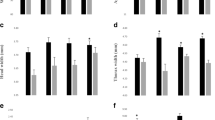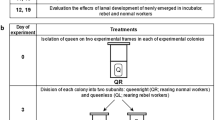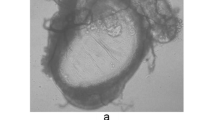Summary.
To determine whether and how honeybee (Apis mellifera L.) queens control the proportion of male reproductives, experiments were done with colonies under two nutritional conditions at two seasons. During the reproductive season the proportion of male eggs laid by queens under insufficiently-food-supplied conditions was lower than that under sufficiently-food-supplied conditions. The smaller proportion of male egg production could not be accounted for by cannibalization of male eggs by workers. The workers' allocation to male cell construction did not differ between sufficiently- and insufficiently-food-supplied conditions. During the non-reproductive season, however, queens showed much reduced or nearly no production of male eggs, even if the colonies were sufficiently supplied with food. These results suggest that the honeybee queen adjusts the egg sex ratio by referring to both the nutritional resources and their own intrinsic seasonal factors.
Similar content being viewed by others
Author information
Authors and Affiliations
Additional information
Received 7 November 2000; revised 22 January and 13 July 2001; accepted 24 July 2001.
Rights and permissions
About this article
Cite this article
Sasaki, K., Obara, Y. Nutritional factors affecting the egg sex ratio adjustment by a honeybee queen. Insectes soc. 48, 355–359 (2001). https://doi.org/10.1007/PL00001790
Issue Date:
DOI: https://doi.org/10.1007/PL00001790




